Apr 18, 2025 Artificial Intelligence
Agentic Process Automation: Agentic AI Use Cases Across Industries
Apr 18, 2025 Artificial Intelligence
Table of Contents
Apr 18, 2025 Artificial Intelligence
Considering automation of tasks within your organization? Well, it’s truly essential to realize how much of an impact intelligent AI agents can have across various industries. Familiarizing yourself with these Agentic AI Use Cases can truly assist in informing your strategic choices.
So, why should business leaders care about understanding smart AI before they launch themselves directly into process automation? Truthfully, how effectively your automation endeavor succeeds, whether simple or complicated, depends to a large extent upon understanding just what these smart AI agents have to offer.
Yes, that’s right!
The market for AI in automation is booming – it’s projected to hit an astonishing USD 65.8 billion by the year 2031.
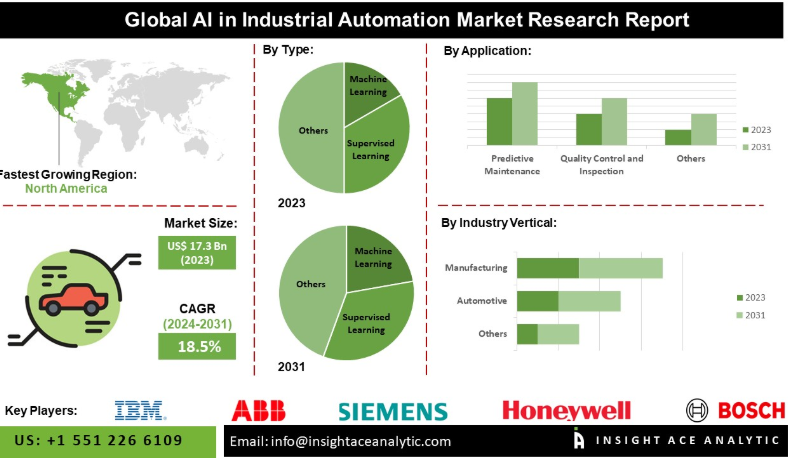
This growth reflects how much people are beginning to view AI as being a game-changer in terms of increasing efficiency and igniting innovation. But there’s something to consider: unless you actually know how to use these technologies or how to apply them correctly, you can end up with suboptimal results.
Yes, traditional Robotic Process Automation (RPA) is useful for simple things, but come on—it’s not good at handling unexpected events. That’s where Agentic AI truly excels. Those AI agents learn, reason, and act independently!
Take, for example, the way in which AI agents evaluate complicated data to detect fraud or offer personalized customer service. That’s moving way ahead in terms of automation.
Indeed, various sectors have various market shares of AI.
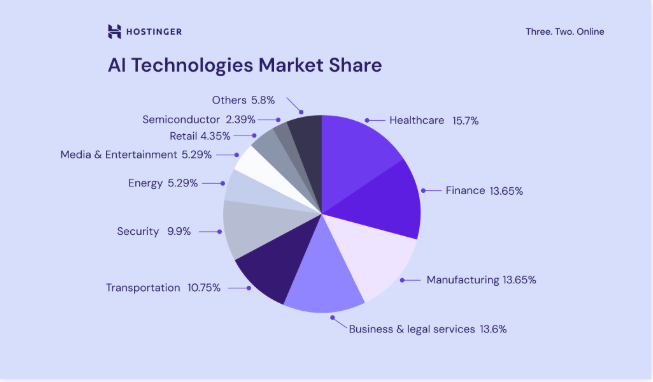
So, in order to have your business truly maximize processes, acquiring knowledge of applicable use cases of Agentic AI is essential. The way you can implement this technology and how intelligent it needs to be will depend upon your sector and exact operational requirement.
This is why careful consideration of Agentic Process Automation is so important to achieving actual, meaningful outcomes.
Here in this post, we’re gonna look at how Agentic AI is actually causing upheaval in a lot of industries—consider security, technology, health, banking, retail, and more!
So stay put—we have more to unwrap. First, let’s clear the basics:
Agentic AI is an excellent fusion of AI & automation engineered to handle tough, repetitive work to sift out inefficiency, learn and adapt constantly to satisfy shifting needs.
And then, as powerful as it is from technology perspective, is changing operations & giving way to companies to reorient their focus from operational optimization to value creation.
Agentic AI, for most organizations a bionic superhero. It is not necessarily about automating some more routine work, it is more of an exercise in analysis, learning, & anticipating outcomes to make processes intelligent & more effectual.
For instance, think of the present GPS Navigation System. Eg: “Take me to the airport” (what you speak to it). It then programmatically computes the fastest/shortest route, considering live traffic & delivers you step-by-step instructions. Agentic AI implementation not just moving along with pre-programmed routes but actually problem-solving.
In other words, Agentic AI is an AI system engineered as “intelligent agents” with the ability to sense their environment, set goals & autonomously take action to accomplish goals.
Briefly understanding Agentic AI, Agentic Process Automation seeks for something greater.
It is not necessarily about an issue of automation of discrete robotic steps; rather that means launching intelligent AI agents which program/process & optimize the entire process — normally complex & multi-dimensional— from start through completion.
For example, AI agents are all skilled musicians, & Agentic Process Automation serve as conductor for their symphony but emerge in tune as an entire operation.
What sets it apart is this orchestration and simplicity throughout an ensemble of tied tasks. More traditionally, simple stuff like traditional Robotic Process Automation (RPA) only deals with automating one defined step.
RPA for instance can be used to do exact data extraction from scanned invoices that should be stored in a database. If, however, there is an error in the invoice or if it doesn’t match the purchase order linked with it, RPA bot will catch that and either post notification for the human to have a look.
Whereas, Agentic Process Automation instead arms the AI agents with the capabilities to resolve these exceptions and allows it to work on an independent level and handle the complete workflow.
Restating the breakthroughs in process automation by Agentic AI requires analyzing its features against conventional automation techniques that include Robotic Process Automation (RPA). The table shows distinct features which distinguish RPA from automation through Agentic AI.
| Feature | Traditional Automation (RPA) | Agentic AI (Intelligent Agents) |
| Task Definition | Requires explicit, step-by-step instructions. | Can be given high-level goals; figures out the steps autonomously. |
| Handling Uncertainty | Struggles with unexpected situations or deviations. | Can reason, adapt, and make decisions in novel situations. |
| Learning Ability | Typically does not learn or improve over time without reprogramming. | Can learn from experience and improve performance continuously. |
| Decision-Making | Limited to pre-defined rules and logic. | Can make complex decisions based on reasoning and learned patterns. |
| Autonomy | Requires significant human oversight for setup and exceptions. | Can operate with greater autonomy and handle exceptions independently. |
| Complexity of Tasks | Best suited for repetitive, rule-based tasks. | Capable of managing more complex, dynamic, and goal-oriented processes. |
| Goal Orientation | Task-oriented; focuses on executing specific steps. | Goal-oriented; focuses on achieving a desired outcome. |
Now, let’s get back to our topic – different use cases of Agentic Artificial Intelligence.
Let us take a little talk about use cases of agentic AI for different industries (examples made simple)
One of the biggest hurdles healthcare organizations faced was the volume of patient data necessary to be analyzed, along with diagnosis complexity and personalized treatment plans. Time constraints and the potential for human error can impact patient outcomes.
Agentic AI will crunch terabytes of medical data (patient history, imaging, genetics information and research papers). Also, through Agentic AI systems to help with diagnosis, predict disease progression as well as treatment suggestions for each patient.
They can also real-time supervise the patients, deploy teams of caregivers for high urgency changes in-surgery and offer surgeons hands on for complex surgical cases.
Over Half (51%) of healthcare leaders are now using AI for in-hospital monitoring of patients in clinical decision support, which indicates a marked increase in technology adoption for patient care.
Also, the worldwide AI in healthcare market is further forecasted to surge from USD 26.69 Billion in 2024 to USD $613.81 Billion by 2034.
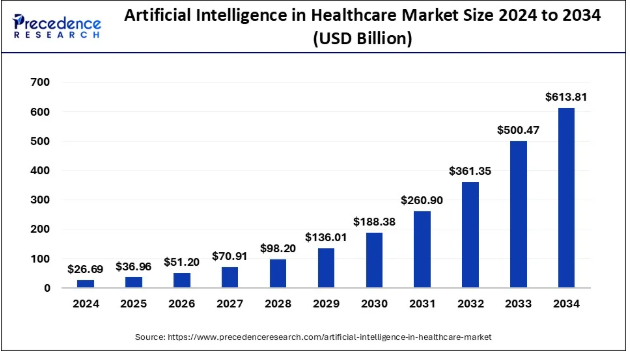
Since, managing your day-to-day stuff—like keeping track of schedules, controlling all those smart home gadgets, and finding info quickly—can be a real hassle, right? You often find yourself switching between a bunch of apps and interfaces, which is just annoying.
That’s where Agentic Process Automation shines. It can make life a whole lot easier. Now, you might be wondering—
Well, Agentic AI is what gives these smart assistants the ability to understand what we say in natural language. It learns what you like over time and can even jump in to help with a ton of tasks.
We’re talking about everything from reminding you of appointments to playing your favorite tunes, controlling the lights, or just giving you quick info when you need it. These AI agents are great examples of how Agentic AI can actually improve our everyday lives.
Basic customer service produces poor responses with long response times and lacks sufficient capacity to handle high volumes of inquiries. The inefficiency of this method calls for the creation of effective Agentic AI business applications.
Agentic AI technology drives sophisticated software agents to handle complex customer inquiries with demanding questions. These are furnished with personal product recommendations and problem resolutions along with human agent hand-offs as needed.
Global AGENTIC AI for Content Creation Market is projected to hit USD 44778 Mn by 2034 (at a CAGR of 46.80% from 2024 USD 963.4 Mn).
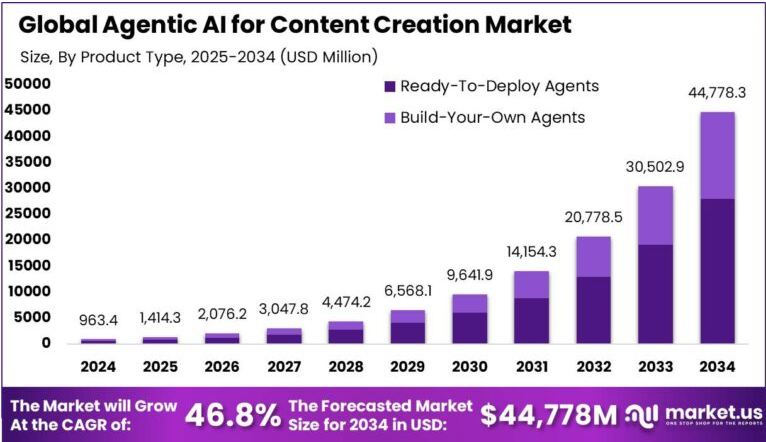
The agents offer 24/7 availability to enhance customer satisfaction while decreasing operational costs thereby achieving significant Agentic AI enterprise use cases. So, get your hands on top AI Business Ideas for Startups and Enterprises for better ROI.
Digital content development in various platforms such as text, photos, video, and sound demands extensive resources in addition to extended production periods. Generative AI development service usage is growing in significance in such content production.
Currently, there is a lot of buzz around Generative AI Use Cases and Applications for Enterprises. And, this is for a reason; no doubt.
AI technologies in an agentic context yield autogenerative results based on user-specified parameters. The system processes data on users’ behavior to provide real-time, personalized propositions for content along with recommendations which are Agentic AI’s value-added applications.
Traditional education tends to be more one-size-fits-all in orientation, which is perhaps not all that conducive to providing for learners’ individual needs and paces. This plainly leaves room for more adaptive learning solutions.
Agentic AI drives personalized education platforms to assess learners’ knowledge, detect where they are in need of help, and adjust lesson plans, material, and speed to meet their individual requirements.
The platforms are able to offer individualized guidance and feedback, which increases results, providing useful examples of Agentic AI use cases in enterprise.
Cyberattacks and scams become more resilient to human detection and prevention in real-time. The imperative need thus increases for more powerful Agentic AI cybersecurity solutions.
Agentic AI is able to detect network traffic, user activity, and transactional activity to identify outliers before they can become security breaches or fraud.
It is also able to automatically block suspicious transactions, put infected machines in quarantine, or trigger security processes, all of which are essential Agentic AI cybersecurity use cases.
Getting the right message in front of the right audience at precisely the right moment? That’s marketing in general, isn’t it? But, traditional marketing certainly comes up short when personalization is being considered. I mean, that personalization that really fuels engagement and conversion. That’s where Agentic AI comes in—it’s revolutionary.
Yes, impressive as all that. This technology is able to sift through volumes of information regarding users, such as browsing history, products they buy, even demographic categories to construct highly targeted ad campaigns in mere moments. Wow, isn’t it? Yes, AI in eCommerce offers tremendous benefits.
Agentic AI use cases in marketing platforms don’t even stop at creating ads; they can also tweak content, select specific groups to serve, as well as adjust how much is spent through bids solely based on individual consumers’ behavior and interests.
It’s all about maximizing bang for your buck, landing ROI through the roof, and in all honesty, really demonstrating how capable agentic AI is in being able to automate those kinds of marketing operations.
Live financial market data exceeding human capabilities causes human traders to lose control over their emotions while making investment decisions.
The main purpose behind implementing Agentic AI financial services in this specific setting drives one of its major application areas. Ai in Banking and Financial institutions brings a lot of advantages.
The Global Agentic AI for Financial Services Market is approximately USD 809 Billion as of 2024, projected to reach USD (803.7 billion for the year 2034).
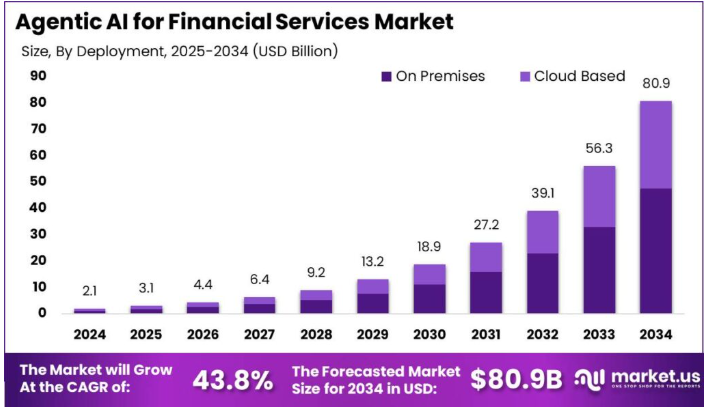
Tools that operate using Agentic AI in finance conduct automated trade execution by identifying recurring market patterns through their scanning function then follow pre-programmed working plans to perform trades while handling data-related risks during operation.
The computerized trade system that humans operate produces better results than human traders because it instantly responds to market shifts to prove effective Agentic AI process automation.
Insurance appears complicated to most people who are unfamiliar with its operations. The insurance system handles challenging tasks by processing claims and doing risk assessments and creating customer underwriting needs. The process of data examination along with manual verification stands as a common requirement due to this situation.
Personalized underwriting processes benefit from Agentic AI which analyzes claims through images combined with documents. It also provides superior risk evaluation using historical patterns found in the data.
Intelligent virtual assistants using Agentic AI models provide solutions to customer inquiries. No doubt, Agentic AI business use cases are many. Businesses gain suitable automation potential through this technology.
Extensive networks and user support requests make up the telecommunications domain supper complex. That way, there is a need to perform required network improvements and predictive equipment maintenance tasks.
Telecom networks gain traffic visibility through Agentic AI implementation which enables their resources to manage themselves autonomously. The system uses modern technology to eliminate network jams simultaneously providing predictive maintenance and automatic chatbot support.
The mentioned applications demonstrate essential Agentic AI implementations both in telecom networks and enterprise operations.
HR departments encounter several difficulties in managing employee training and development as well as performance management. Even employee retention issues after the recruitment process.
The use of Agentic artificial intelligence allows organizations to create customized training systems for employees. They are reliable to perform automatic review assessments through data analysis and notifies workers about reasons for job departure thus demonstrating practical yet valuable use cases of Agentic AI in HR.
The pharmaceutical sector encounters multiple obstacles relating to medication development, together with trial management and manufacturing enhancement.
Just like medical research, Agentic AI speeds up drug discovery. It simultaneously enhances clinical trials through better design and management practices, determines equipment failure timing, and streamlines production schedules to present important use cases of Agentic AI in pharmaceutical operations..
The automotive industry is facing a major shift through autonomous vehicles alongside electric vehicles, which need connected cars, sophisticated software, and AI.
Vehicle predictive maintenance, optimized manufacturing and improved in-car assistance through intelligent assistants showcase the main application of Agentic AI in automotive while demanding specific AI development company specialization.
Law professionals allocate considerable time to perform contract examinations alongside legal studies and document analysis tasks that require expensive durations. Research indicates that lawyers commit 40% of their professional day toward document review (Deloitte).
The business opportunity for AI agents as a time-saving solution demonstrates significant strength in this market.
Agentic AI systems provide three procedural capabilities including contract analysis automation, legal research data mining from extensive resources and document review which extracts essential patterns from documents.
The workflow management capabilities of Agentic AI process automation decrease expenses and cut down costs for these particular tasks thus highlighting its strength in the legal field.
The market trend shows that law firms commonly choose to work with companies offering great generative ai development services that possess proven experience in legal tech solutions.
The implementation of Agentic AI creates significant industrial changes throughout all industries.
Modern business automation now goes beyond basic automation processes alone. Agentic AI technology advances its capabilities by enabling businesses to recognize upcoming requirements and identify prospective market growth chances for different sectors including supply chain, security and healthcare production.
Companies experiencing operational problems or facing urgent innovation demands can find Agentic AI useful. It provides a useful automation system which supports their ongoing operations.
Organizations of any company size can achieve these realistic possibilities through their growth strategies. Agentic AI offers a new level of advancement which is ready for your exploration. You should contact us right now.
Why not reach out to us today? We can show you how our personalized solutions can streamline your processes, enhance security, and boost efficiency.
Let Agentic AI help unlock your business’s true potential. As a top-notch software development company, we’re all about customizing Agentic AI process automation to fit your unique needs.
Between agentic AI and generative AI the main distinction emerges from their functional purpose. Generative AI technology uses large language models together with image generators to produce new content which includes text and images as well as audio and software code. The system analyzes data patterns to produce fresh output which resembles these patterns.
Agentic AI directs its operations toward independent execution and goal completion. The main goal of agentic AI is environmental perception followed by reasoning and planning alongside acting to achieve set objectives but it can utilize generative AI for content generation as needed. Agentic AI functions as a thinking worker whereas generative AI works as a creative instrument.
Agentic AI deployment should follow a systematic approach for successful implementation to succeed. Effective implementation of agentic AI requires clear definitions of AI agent targets along with high-quality and relevant training data access as well as strong action and performance monitoring systems.
Humans need clear explanations about agent reasoning since transparency remains important for understanding how the system operates. All ethical analysis centered on bias detection and mitigation needs to establish its presence from the beginning because it is crucial for the system. Agentic development benefits from sequential applications with ongoing evaluation because it lets users verify that the system keeps following its original goals.
Agentic AI technology in manufacturing facilities enables automated scheduling as well as predictive maintenance routines and adaptive quality testing with real-time supply chain management and improved robotic collaboration safety. The technology allows unmanned inventory control and automatic operational line adaptation through data analysis to boost production performance and quality outcomes.
Agentic AI systems currently receive exploration for use in four primary sectors: healthcare, finance, retail and supply chain operations. The technology is now appearing in creative domains because organizations need autonomous solutions to achieve enhanced operational efficiency.
Next-generation AI agents will perform advanced autonomous procedures in future systems. Specialized agents working together with humans will control entire process management systems through agentic automation. Ethical systems must remain essential because advanced technologies will merge more frequently to function as formidable companions and problem-resolvers.